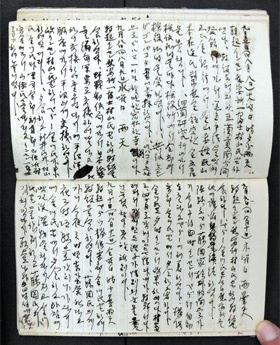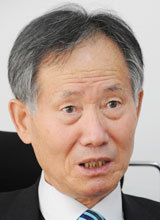Scholar discloses diary by manager of WWII Japanese military brothels
By Korea HeraldPublished : Aug. 7, 2013 - 20:08

New evidence showing that the Japanese military methodically mobilized so-called comfort women, or sex slaves during World War II, has been revealed.
It also shows that frontline Japanese units had brothels as part of their organization and that they took comfort women as well as set up brothels whenever they moved.
Ahn Byong-jick, a Seoul National University honorary professor, on Tuesday disclosed a diary kept by a Korean who had managed comfort stations, or de facto brothels, for Japanese soldiers in Burma and Singapore between July 1942 and December 1944.
It also shows that frontline Japanese units had brothels as part of their organization and that they took comfort women as well as set up brothels whenever they moved.
Ahn Byong-jick, a Seoul National University honorary professor, on Tuesday disclosed a diary kept by a Korean who had managed comfort stations, or de facto brothels, for Japanese soldiers in Burma and Singapore between July 1942 and December 1944.

The man who kept the diary mostly in Chinese letters followed the comfort women to Burma in July 1942, and then managed brothels in Burma and Singapore until he returned to Korea in December 1944.
Ahn did not reveal his name, though, probably considering the strong anti-Japanese sentiment in Korea. The man was born in 1905 and died in 1979.
The diary refutes some Japanese figures’ claim that neither the Japanese government nor the military were involved in the mobilization of comfort women.
The writer joined his brother-in-law, who was to leave for Burma with comfort women, in July 1942 because he faced severe economic hardship as a result of Japan strengthening its colonial exploitation of Korea in the 1940s.
According to the diary translated by Ahn in plain Korean and to be published by publishing company Esoop next week, a group of hundreds of unmarried Korean women taken as comfort women left from a port in Busan on July 10, 1942.
Civilians who were chosen by proxies for the Japanese military enlisted the comfort women, who were then given the status of quasi-civilian personnel working for the military. They were issued travel certificates and thus able to use military transport systems, including naval ships.
The diary says that comfort women, divided into two groups of about 20, arrived in Burma on Aug. 20, and then were deployed to Japanese bases and urban areas.
Comfort stations were nominally managed by civilians but substantially under the direct control of the Japanese military.
The brothels belonged exclusively to Japanese units and submitted reports regularly. They were also moved constantly according to military orders.
The diary also contains stories regarding the management and the living conditions of the comfort stations.
The existence of Japanese military brothels in Burma had been confirmed in a testimony by late Korean comfort woman Moon Ok-joo, who was drafted there.
By Chun Sung-woo (swchun@heraldcorp.com)
-
Articles by Korea Herald


















![[Eye Interview] 'If you live to 100, you might as well be happy,' says 88-year-old bestselling essayist](http://res.heraldm.com/phpwas/restmb_idxmake.php?idx=652&simg=/content/image/2024/05/03/20240503050674_0.jpg&u=)
